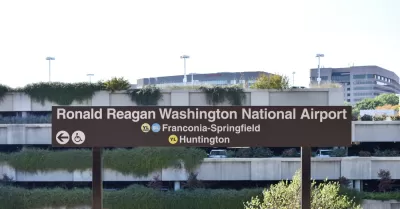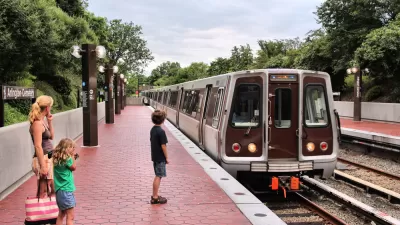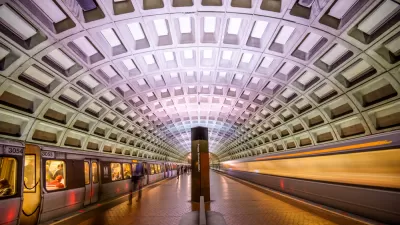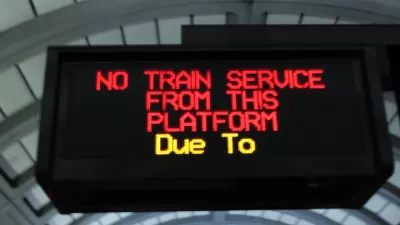The disruptions caused by an October 12 train derailment on D.C. Metrorail's Blue Line are spreading to the entire system.

Metrorail—the rail transit system administered by the Washington Metropolitan Area Transit Authority (WMATA) in the D.C. region—is facing a cascading series of disruptions after a 7000-series train on the Blue Line derailed at 5 pm on October 12. The derailment left riders stranded and caused one serious injury during the evening rush hour commute.
The next day, the WMATA suspended service between the Rosslyn and Foggy Bottom Metro stations, providing replacement bus service between the stations. Inbound Blue Line trains were also diverted to the Yellow Line.
Also on the day following the derailment, the National Transportation Safety Board and the WMATA launched investigations into the causes of the derailment. In an article for the Washington Post, Justin George and Ian Duncan report that "wheel assemblies on Metro rail cars at fault in last week’s derailment had failed repeatedly in recent years — and that renewed inspections [the week of the derailment] identified almost two dozen more cars with assemblies that were unsafe."
"Metro pulled the 7000 series cars from service and Homendy said other transit agencies that use cars from the same manufacturer should also check their cars," according to the article.
Metrorail commuters were seeing the effects of that announcement this morning, after the WMATA decided to pull 60 percent of its fleet from service, leaving 40 trains to operate on all six of the system's lines.
"Trains will run every 30 minutes and be limited to six cars each of Metro’s older models. Riders should expect long wait times and crowding during peak hours, and should seek alternatives to Metrorail including buses if possible. D.C. Public Schools said late student arrivals on Monday will be marked as excused," reports Alejandro Alvarez in the source article linked below.
The same article warns that drivers might see increased congestion because of the service disruptions and reports the Monday commute scene on Metrorail as frustrated rail commuters experienced delays and confusion.
The Metrorail system has been beset by poor repair over the past decade. The SafeTrack system repair program disrupted service from 2016 to 2018 after a spate of high profile incidents, including a fire at the Federal Center SW station in March 2016. The Blue Line was shut down earlier this year for repairs. All that hard work for the WMATA and pain for regional commuters seemed to have paid off—in August, the WMATA put out a report touting improved reliability throughout the Metrorail system.
FULL STORY: Lengthy delays after Metrorail pulls 60% of fleet for derailment investigation

Planetizen Federal Action Tracker
A weekly monitor of how Trump’s orders and actions are impacting planners and planning in America.

Maui's Vacation Rental Debate Turns Ugly
Verbal attacks, misinformation campaigns and fistfights plague a high-stakes debate to convert thousands of vacation rentals into long-term housing.

Restaurant Patios Were a Pandemic Win — Why Were They so Hard to Keep?
Social distancing requirements and changes in travel patterns prompted cities to pilot new uses for street and sidewalk space. Then it got complicated.

In California Battle of Housing vs. Environment, Housing Just Won
A new state law significantly limits the power of CEQA, an environmental review law that served as a powerful tool for blocking new development.

Boulder Eliminates Parking Minimums Citywide
Officials estimate the cost of building a single underground parking space at up to $100,000.

Orange County, Florida Adopts Largest US “Sprawl Repair” Code
The ‘Orange Code’ seeks to rectify decades of sprawl-inducing, car-oriented development.
Urban Design for Planners 1: Software Tools
This six-course series explores essential urban design concepts using open source software and equips planners with the tools they need to participate fully in the urban design process.
Planning for Universal Design
Learn the tools for implementing Universal Design in planning regulations.
Heyer Gruel & Associates PA
JM Goldson LLC
Custer County Colorado
City of Camden Redevelopment Agency
City of Astoria
Transportation Research & Education Center (TREC) at Portland State University
Jefferson Parish Government
Camden Redevelopment Agency
City of Claremont





























